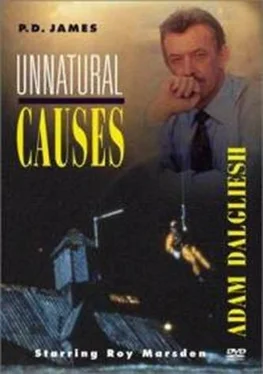P James - Unnatural Causes
Здесь есть возможность читать онлайн «P James - Unnatural Causes» весь текст электронной книги совершенно бесплатно (целиком полную версию без сокращений). В некоторых случаях можно слушать аудио, скачать через торрент в формате fb2 и присутствует краткое содержание. Жанр: Детектив, на английском языке. Описание произведения, (предисловие) а так же отзывы посетителей доступны на портале библиотеки ЛибКат.
- Название:Unnatural Causes
- Автор:
- Жанр:
- Год:неизвестен
- ISBN:нет данных
- Рейтинг книги:4 / 5. Голосов: 1
-
Избранное:Добавить в избранное
- Отзывы:
-
Ваша оценка:
- 80
- 1
- 2
- 3
- 4
- 5
Unnatural Causes: краткое содержание, описание и аннотация
Предлагаем к чтению аннотацию, описание, краткое содержание или предисловие (зависит от того, что написал сам автор книги «Unnatural Causes»). Если вы не нашли необходимую информацию о книге — напишите в комментариях, мы постараемся отыскать её.
Unnatural Causes — читать онлайн бесплатно полную книгу (весь текст) целиком
Ниже представлен текст книги, разбитый по страницам. Система сохранения места последней прочитанной страницы, позволяет с удобством читать онлайн бесплатно книгу «Unnatural Causes», без необходимости каждый раз заново искать на чём Вы остановились. Поставьте закладку, и сможете в любой момент перейти на страницу, на которой закончили чтение.
Интервал:
Закладка:
Half an hour later he closed the church door quietly behind him and set off on the last few miles of the journey to Monksmere. He had written to his aunt to say that he would probably arrive at half past two and, with luck, he would be there almost precisely on time. If, as was usual, his aunt came out of the cottage at two-thirty she should see the Cooper Bristol just breasting the headland. He thought of her tall, angular, waiting figure with affection. There was little unusual about her story and most of it he had guessed, picked up as a boy from snatches of his mother’s unguarded talk or had simply known as one of the facts of his childhood. Her fiancé had been killed in 1918 just six months before the Armistice when she was a young girl. Her mother was a delicate, spoilt beauty, the worst possible wife for a scholarly country clergyman as she herself frequently admitted, apparently thinking that this candour both justified and excused in advance the next outbreak of selfishness or extravagance. She disliked the sight of other people’s grief since it rendered them temporarily more interesting than herself and she decided to take young Captain Maskell’s death very hard. Whatever her sensitive, uncommunicative and rather difficult daughter suffered it must be apparent that her mother suffered more; and three weeks after the telegram was received she died of influenza. It is doubtful whether she intended to go to such lengths but she would have been gratified by the result. Her distraught husband forgot in one night all the irritations and anxieties of his marriage and remembered only his wife’s gaiety and beauty. It was, of course, unthinkable that he should marry again, and he never did. Jane Dalgliesh, whose own bereavement hardly anyone now had the time to remember, took her mother’s place as hostess at the vicarage and remained with her father until his retirement in 1945 and his death ten years later. She was a highly intelligent woman and if she found unsatisfying the annual routine of housekeeping and parochial activities, predictable and inescapable as the liturgical year, she never said so. Her father was so assured of the ultimate importance of his calling that it never occurred to him that anyone’s gifts could be wasted in its service. Jane Dalgliesh, respected by the parishioners but never loved, did what had to be done and solaced herself with her study of birds. After her father’s death the papers she published, records of meticulous observation, brought her some notice; and in time what the parish had patronisingly described as “Miss Dalgliesh’s little hobby” made her one of the most respected of amateur ornithologists. Just over five years ago she had sold her house in Lincolnshire and bought Pentlands, a stone cottage on the edge of Monksmere Head. Here Dalgliesh visited her at least twice a year.
They were no mere duty visits, although he would have felt a responsibility for her if she were not so obviously self-sufficient that, at times, even to feel affection seemed a kind of insult. But the affection was there and both of them knew it. Already he was looking forward to the satisfaction of seeing her, to the assured pleasures of a holiday at Monksmere.
There would be a driftwood fire in the wide hearth scenting the whole cottage, and before it the high-backed armchair once part of his father’s study in the vicarage where he was born, the leather smelling of childhood. There would be a sparsely furnished bedroom with a view of sea and sky, a comfortable if narrow bed with sheets smelling faintly of woodsmoke and lavender, plenty of hot water and a bath long enough for a six-foot-two man to stretch himself in comfort. His aunt was herself six foot tall and had a masculine appreciation of essential comforts. More immediately, there would be tea before the fire and hot buttered toast with homemade potted meat. Best of all, there would be no corpses and no talk of them. He suspected that Jane Dalgliesh thought it odd that an intelligent man should choose to earn his living catching murderers and she was not a woman to feign polite interest when she felt none. She made no demands on him, not even the demands of affection, and because of this she was the only woman in the world with whom he was completely at peace. He knew exactly what the holiday offered. They would walk together, often in silence, on the damp strip of firm sand between the sea’s foam and the pebbled rises of the beach. He would carry her sketching paraphernalia, she would stride a little ahead, hands dug in her jacket pockets, eyes searching out where wheatears, scarcely distinguishable from pebbles, had lighted on the shingle, or following the flight of tern or plover. It would be peaceful, restful, utterly undemanding; but at the end of ten days he would go back to London with a sense of relief.
He was driving now through Dunwich Forest where the Forestry Commission’s plantations of dark firs flanked the road. He fancied that he could smell the sea now; the salt tang borne to him on the wind was sharper than the bitter smell of the trees. His heart lifted. He felt like a child coming home. And now the forest ended, the sombre dark green of the firs ruled off by a wire fence from the water-coloured fields and hedges. And now they too passed and he was driving through the gorse and heather of the heathlands on his way to Dunwich. As he reached the village and turned right up the hill which skirted the walled enclosure of the ruined Franciscan friory there was the blare of a car’s horn and a Jaguar, driven very fast, shot past. He glimpsed a dark head, and a hand raised in salute before, with a valedictory hoot, the car was out of sight. So Oliver Latham, the dramatic critic, was at his cottage for the weekend. That was hardly likely to inconvenience Dalgliesh for Latham did not come to Suffolk for company. Like his near neighbour, Justin Bryce, he used his cottage as a retreat from London, and perhaps from people, although he was at Monksmere less frequently than Bryce. Dalgliesh had met Latham once or twice and had recognised in him a restlessness and tension which found an echo in his own character. He was known to like fast cars and fast driving, and Dalgliesh suspected that it was in the drive to and from Monksmere that he found his release. It was difficult to imagine why else he kept on his cottage. He came to it seldom, never brought his women there, took no interest in furnishing it, and used it chiefly as a base for wild drives around the district which were so violent and irrational that they seemed a kind of abreaction.
As Rosemary Cottage came into sight on the bend of the road Dalgliesh accelerated. He had little hope of driving past unobserved but at least he could drive at a speed which made it unreasonable to stop. As he shot past he just had time to see out of the corner of his eye a face at an upstairs window. Well, it was to be expected. Celia Calthrop regarded herself as the doyenne of the small community at Monksmere and had assigned herself certain duties and privileges. If her neighbours were so ill-advised as not to keep her informed of the comings and goings of themselves and their visitors she was prepared to take some trouble to find out for herself. She had a quick ear for an approaching car and the situation of her cottage, just where the rough track across the headland joined the road from Dunwich, gave her every opportunity of keeping an eye on things.
Miss Calthrop had bought Brodie’s Barn, renamed Rosemary Cottage, twelve years previously. She had got it cheap and by gentle but persistent bullying of local labour, had converted it equally cheaply from a pleasing if shabby stone house to the romanticised ideal of her readers. It frequently featured in women’s magazines as “Celia Calthrop’s delightful Suffolk residence where, amid the peace of the countryside, she creates those delightful romances which so thrill our readers.” Inside, Rosemary Cottage was very comfortable in its pretentious and tasteless way; outside, it had everything its owner considered appropriate to a country cottage, a thatched roof (deplorably expensive to insure and maintain), a herb garden (a sinister looking patch this; Miss Calthrop was not successful with herbs), a small artificial pond (malodorous in summer) and a dovecote (but doves obstinately refused to roost in it). There was also a sleek lawn on which the “writers community”-Celia’s phrase-was invited in summer to drink tea. At first Jane Dalgliesh had been excluded from the invitations, not because she didn’t claim to be a writer but because she was a solitary, elderly spinster and therefore, in Miss Calthrop’s scale of values, a social and sexual failure rating only a patronising kindness. Then Miss Calthrop discovered that her neighbour was regarded as a distinguished woman by people well qualified to judge and that the men who, in defiance of propriety, were entertained at Pentlands and who were to be met trudging along the shore in happy companionship with their hostess were frequently themselves distinguished. A further discovery was more surprising. Jane Dalgliesh dined with R. B. Sinclair at Priory House. Not all those who praised Sinclair’s three great novels, the last written over thirty years ago, realised that he was still alive. Fewer still were invited to dine with him. Miss Calthrop was not a woman obstinately to persist in error and Miss Dalgliesh became “dear Jane” overnight. For her part she continued to call her neighbour “Miss Calthrop” and was as unaware of the rapprochement as she had been of the original disdain. Dalgliesh was never sure what she really thought of Celia. She seldom spoke about her neighbours and the women were too rarely in each other’s company for him to judge.
Читать дальшеИнтервал:
Закладка:
Похожие книги на «Unnatural Causes»
Представляем Вашему вниманию похожие книги на «Unnatural Causes» списком для выбора. Мы отобрали схожую по названию и смыслу литературу в надежде предоставить читателям больше вариантов отыскать новые, интересные, ещё непрочитанные произведения.
Обсуждение, отзывы о книге «Unnatural Causes» и просто собственные мнения читателей. Оставьте ваши комментарии, напишите, что Вы думаете о произведении, его смысле или главных героях. Укажите что конкретно понравилось, а что нет, и почему Вы так считаете.












